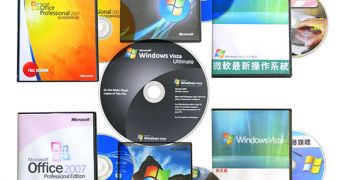Microsoft's latest Windows client is not, by any measure, a hit with software pirates. And in this context, it seems that the Redmond company is ripping the fruits of the anti-piracy mitigations it has integrated by default into Windows Vista. According to the 2007 Anti-Piracy Year in Review report put together by the Software & Information Industry Association (SIIA) in mid-February 2007, Vista is nowhere to be found in the top 10 most pirated software on the Internet and by companies. Neither is Windows XP for that matter.
Looking back to 2007, SIIA put together a list with the most frequently pirated software titles on the Internet. At number one is McAfee VirusScan, runner-up Symantec Norton Anti-Virus, and the bronze winner is McAfee Internet Security Suite. Intuit TurboTax comes in at number four, then Adobe Photoshop; Adobe Acrobat; Intuit Quicken Home and Business; Symantec Norton pcAnywhere; Symantec Norton Ghost and Adobe Creative Suite. Neither Windows XP nor Windows Vista have made the top 10.
The two Windows operating systems are also missing from the list containing the 2007 software titles most frequently pirated by companies. In this regard, Symantec Norton Anti-Virus is top dog, with Adobe Acrobat in second place and Symantec PC Anywhere third. Adobe is close to the podium with PhotoShop, followed by Autodesk AutoCAD; Adobe DreamWeaver; Roxio Easy CD/DVD Creator; Roxio Toast Titanium; Ipswitch WS_FTP and Nero Ultra Edition.
With the advent of Vista back at the end of 2006 and at the debut of 2007, Microsoft not only revamped Volume Activation introducing version 2.0, but also took the effects of the Windows Genuine Advantage anti-piracy mechanism one step further. Pirated copies of Windows Vista were set to revert to Reduced Functionality Mode, virtually locking the user out of the operating system. While Vista piracy is indeed a problem that Microsoft has had to address face-on, according to SIIA it could be a lot worse.
At the same time, since Windows XP, without the added anti-piracy measures, also managed to keep itself out of the top 10 most pirated software products, the WGA is obviously not the contributing factor. But at this point in time, Microsoft is moving one step further with the evolution of both its operating systems via the introduction of Vista SP1 and XP SP3.
With Vista SP1, the Redmond company is killing two of the most popular activation workarounds for the latest Windows client, the OEM and the 2099 Timer cracks. But at the same time, Microsoft is cutting down the Reduced Functionality Mode kill-switch from the operating system and has taken the behavior of pirated Vista SP1 back to that of XP SP2, or XP SP3 for that matter.
With the third and final service pack for Windows XP, the Redmond company announced no new anti-piracy measures. In this regard, XP SP3 brings nothing new to the table in comparison to SP2. And while Microsoft is working to build Windows 7, the company has not revealed any of the new anti-piracy mitigations that it is cooking for the next iteration of Windows.

 14 DAY TRIAL //
14 DAY TRIAL //